初中英语多媒体教学课件:Module 4 New technology Unit 2(外研版 八下)(共24张PPT)
初二英语Module4Newtechnology
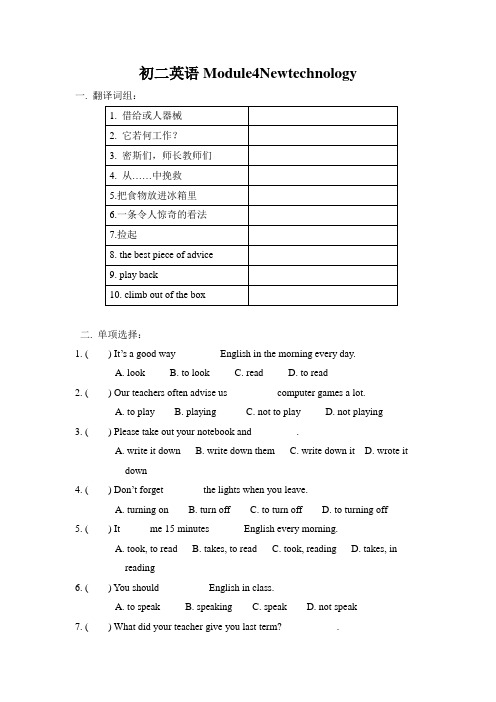
初二英语Module4Newtechnology一. 翻译词组:二. 单项选择:1. ( ) It’s a good way ________ English in the morning every day.A. lookB. to lookC. readD. to read2. ( ) Our teachers often advise us _________ computer games a lot.A. to playB. playingC. not to playD. not playing3. ( ) Please take out your notebook and_________.A. write it downB. write down themC. write down itD. wrote itdown4. ( ) Don’t forget _______ the lights when you leave.A. turning onB. turn offC. to turn offD. to turning off5. ( ) It _____ me 15 minutes ______ English every morning.A. took, to readB. takes, to readC. took, readingD. takes, inreading6. ( ) You should _________ English in class.A. to speakB. speakingC. speakD. not speak7. ( ) What did your teacher give you last term? ________.A. Some advices.B. A lots of adviceC. A piece of adviceD.Advices8. ( ) _____ you ______ the radio in English?A. How about, listening toB. Why not, listenC. Will, listenD. Why don’t, listen9. ( )It’s hard for Lingling to understand TV programs _____ English.A. onB. inC. atD. around10. ( )How can I practice _______ ?A. speaking EnglishB. listen to English songsC. to watch Englishfilm11. ( ) Does he ______ English moves?A. enjoy to watchB. enjoys seeingC. likes watchingD. enjoywatching12. ( ) Which is wrong?_________ is a good idea to learn English.A. Listening to real English songsB. Watching American filmsC. Reading lots of newspaper in EnglishD. Translating every words13. ( ) Can you tell me _________ English well?A. how to learnB. what to learnC. how can I learn14. ( ) Look, Mr. Li is ______ the visitors ______ our school.A. show, aroundB. showing, aroundC. showed, around15. ( ) The meeting didn’t start___ everyone was there.A. becauseB. untilC. whyD. if16. ( ) The boy ___ to bed ___ his mother came in.A. went not; untilB. didn’t go; afterC. went; untilD. didn’t go; until17. ( ) I won’t believe you___ I have seen it with my own eyes.A. beforeB. untilC. afterD. when18. ( ) He ___ home ___ she was satisfied ___ his answer yesterday.A. didn’t go; until; withB. wasn’t go; after; toC. doesn’t go; before; withD. didn’t go; until; to19. ( ) He ___ back until the work ___ done.A. isn’t; will beB. isn’t; isC. won’t be; will beD. won’t be; is20. ( ) They didn’t start the work ___ their teacher came back.A. untilB. whileC. as soon asD. if三. 扫瞄明白得In 1620, about half the USA was covered by forests.Today the forests have almost gone.A lot of good land has gone with them, leaving only sand.China doesn't want to copy the USA's example.We're planting more and more trees.We've built the " Great Green Wall" of trees across northern part of our country.The Great Green Wall is 7,000 kilometers long, and between 400 and 1,700 kilometers wide.It will stop the wind from blowing the earth away.It will stop the sand from moving towards the rich farmland in the south.More "Great Green Walls" are needed.Trees must be grown all over the world.Great Green Walls will make the world better.依照短文内容,选择精确谜底。
2019-2020年八年级英语下册 Module 4 New technology备课教案 外研版
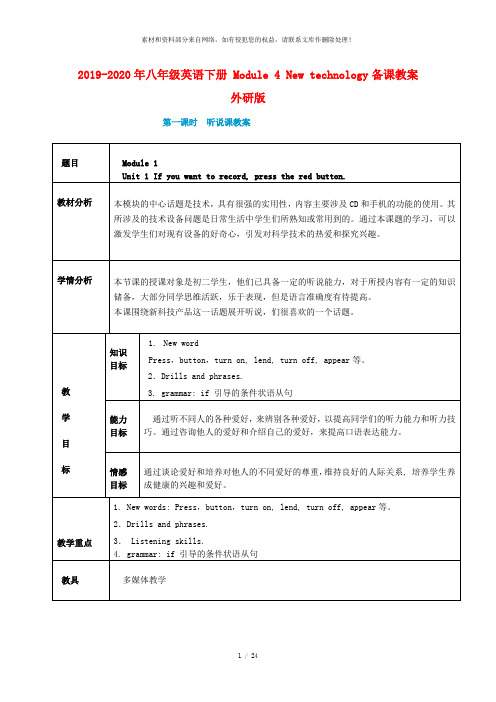
2019-2020年八年级英语下册 Module 4 New technology备课教案外研版第一课时听说课教案第二课时读写课教案第三课时语法课教案第四课时复习课达标课学生使用材料一(听说课)1.一听:Listen to the tapes and answer the questionsWhat has Betty got?------------------------------------------Does she know how to use the video camera?---------------------------------------Does Tony Toy know how to use it?--------------------------------------------二听: Listen to the tapes again, and do the exercise on the book Page 26 part 2: Answer the questions. Use the words in the box to help you.________________________________________________________2.(一)read the passage as soon as possible , and finish the questions below. Why does Sally have the CD recorder?--------------------------------------------------What do they do to find out how t work?--------------------------------------------------(二)Listen to the passage and answer the questions:How do they know if it is working ?---------------------------------------------------Why isn’t Sally playing on the recording ?-------------------------------------------------What do they decide to do?---------------------------------------------------3.学习语言点:(1)借 borrow…from…借入;lend…to…借出;keep 借一段时间(2)Turn 有关短语:turn on 打开; turn off 关上;turn up 开大一点;turn down 关小一点(3)Wait for 等待(4)Send…to…发送…到….(5)Connect…to…把…连接到…学生使用材料二(读写课)1.students work in pairs, talk about what they can use a mobile phone to-------------------------------------------------------------------------------------------2. Reading : ;(1)Fast-reading: (速读全文,回答问题)Read the whole text fast and answer the questions:(1) If a snake bites you, what should you do?______________________________(2) Why should we take the photo ?(2) Careful-reading:(分段阅读,回答问题)(1) Read paragraph 1and finish the question:<1> If a snake bites you, take a photo to__________________________________(2) Read paragraph 2—4 ,answer the questions:<1> When the snake bit Mr Jackson, what was he doing?<2>Why did Mr.Jackson throw the snake across the room ?------------------------------------------------------------------(3) Read paragraph 5-7and finish the questions:<1>Why could not doctors say what was wrong?__________________________________<2>Where did doctors send the phone photo?__________________________________<3>What is the writer’s advice?------------------------------------------------------3.学习语言点:(1). take a photo 拍照(2).surprise 的有关用法Be surprised at…对…吃惊To one’s surprise 令某人感到吃惊的是In surprise 吃惊地(3)pick up 捡起(4)hit sb. On/in ….打某人…地方(5)go across 从…表面穿过Go through 从…空间穿过(6)worry about…=be worried about 为….而担忧4.写作训练Writing :Write a short story about how a mobile phone saved someone’s life. _______________________________________________________________________________ _______________________________________________________________________________ __________5.作业:1. Remember what we have learnt this class.2. Write something about the use of mobile phone学生使用材料三(语法课)1. 听歌曲,看句子________________________________________________________________________ _______________________________________________________________________________________________________________________________________2. 观察、归纳、总结句子结构:If you want to listen to the music, press the “play” button.If you want to listen to the music again, press the “back ” button ._______________________________________________________________________________ __________________________________________________________________________________________________________________________________________ ___________________________________________________________3.专项训练:小组内进行对话练习,讨论如何使用录音机进行播放音乐。
Module4 New technology Unit1教学课件(外研版八下)
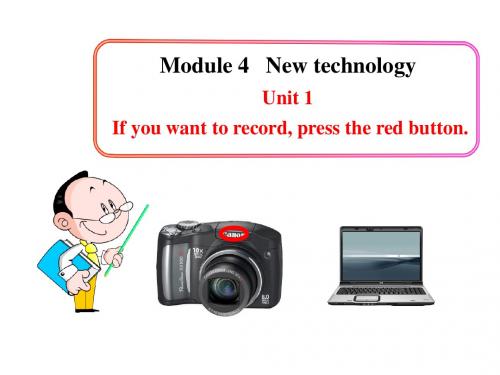
library. 学生们想从图书馆借几本书。
2. How does it work? 它如何工作? how 怎样;怎么;如何
How is this word pronounced?
这个词怎么发音?
How does this machine work?
这机器是怎么运行的? How did you do that? 你是怎么做到的?
Presentation
ordinary camera
digital camera
If you want to take some photos, …
press this button
If you want to turn it on, … If you want to turn it off, …
press the blue button.
Language points
1. lend 借出,即借给别人东西。其常用句型结构是lend sb. sth. , 或lend sth. to sb.。
Could you lend us your dictionary?
能把你的字典借给我们吗? 其反义词“借入”是borrow,其常用句型结构是borrow sth. from sb.。 The students want to borrow some books from the
Tony is giving Betty instructions on how to use the video camera on her mobile phone.
Answer the questions. Use the words below to help you.
button choose copy connect
【教育学习文章】Module 4 New Technology教案
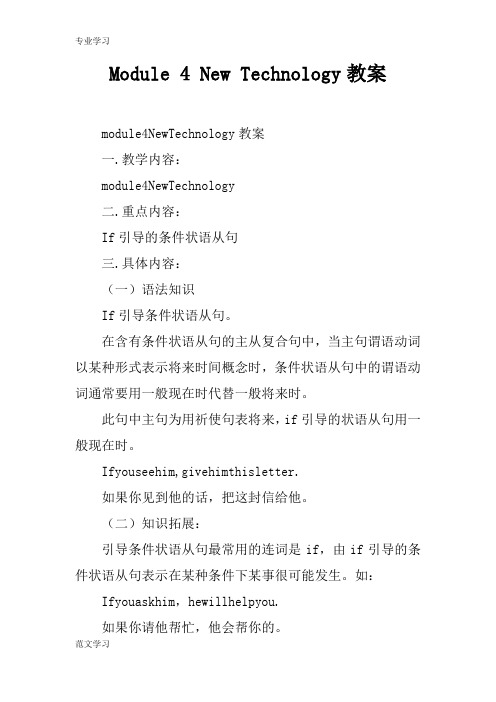
Module 4 New Technology教案module4NewTechnology教案一.教学内容:module4NewTechnology二.重点内容:If引导的条件状语从句三.具体内容:(一)语法知识If引导条件状语从句。
在含有条件状语从句的主从复合句中,当主句谓语动词以某种形式表示将来时间概念时,条件状语从句中的谓语动词通常要用一般现在时代替一般将来时。
此句中主句为用祈使句表将来,if引导的状语从句用一般现在时。
Ifyouseehim,givehimthisletter.如果你见到他的话,把这封信给他。
(二)知识拓展:引导条件状语从句最常用的连词是if,由if引导的条件状语从句表示在某种条件下某事很可能发生。
如:Ifyouaskhim,hewillhelpyou.如果你请他帮忙,他会帮你的。
Ifyoufailintheexam,youwilllethimdown.如果你考试不及格,你会让他失望的。
另外,if从句还表示不可实现的条件或根本不可能存在的条件,也就是一种虚拟的条件或假设,从句多用一般过去时或过去完成时。
如:IfIwereyou,Iwouldinvitehimtotheparty.如果我是你,我会邀请他参加聚会。
IwouldhavearrivedmuchearlierifIhadnotbeencaughtinth etraffic.如果没有堵车,我会到的早一点儿。
那么,除了if之外,是否还有其他连词也可以引导条件状语从句呢?回答是肯定的,不仅有,还有很多。
这些词由于出现的频率较小,且用法较复杂一些,所以不为大家所熟知罢了。
下面就这些词的用法以例句的形式进行一下简单总结。
(1)unlessconj.除非,若不,除非在……的时候youwillfailtoarrivethereintimeunlessyoustartearlier.如果你不早点动身,你就不能及时赶到那儿。
Unlessitrains,thegamewillbeplayed.除非下雨,比赛将照常进行。
Module 4 New technology Unit1
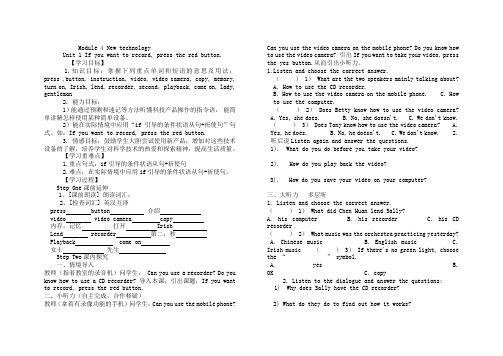
Module 4 New technologyUnit 1 If you want to record, press the red button.【学习目标】1.知识目标:掌握下列重点单词和短语的意思及用法:press ,button, instruction, video, video camera, copy, memory, turn on, Irish, lend, recorder, second,playback, come on, lady, gentleman2. 能力目标:1)能通过预测和速记等方法听懂科技产品操作的指令语,能简单讲解怎样使用某种简单设备。
2)能在实际情境中应用“if引导的条件状语从句+祈使句”句式。
如:If you want to record, press the red button.3. 情感目标:鼓励学生大胆尝试使用新产品,增加对这些技术设备的了解,培养学生对科学技术的热爱和探索精神,提高生活质量。
【学习重难点】1.重点句式:if引导的条件状语从句+祈使句2.难点:在实际情境中应用if引导的条件状语从句+祈使句。
【学习过程】Step One课前延伸1、[课前朗读] 朗读词汇:2、[检查词汇] 英汉互译press button 介绍video video camera copy内存,记忆打开 IrishLend recorder 第二;秒Playback come on女士先生Step Two课内探究一、情境导入教师(指着教室的录音机)问学生: Can you use a recorder? Do you know how to use a CD recorder? 导入本课,引出课题:If you want to record, press the red button.二、小听力(自主完成,合作释疑)教师(拿着有录像功能的手机)问学生:Can you use the mobile phone? Can you use the video camera on the mobile phone? Do you know how to use the video camera? 引出If you want to take your video, press the yes button.从而引出小听力。
外研版英语八下《Module 4 New technology》word学案
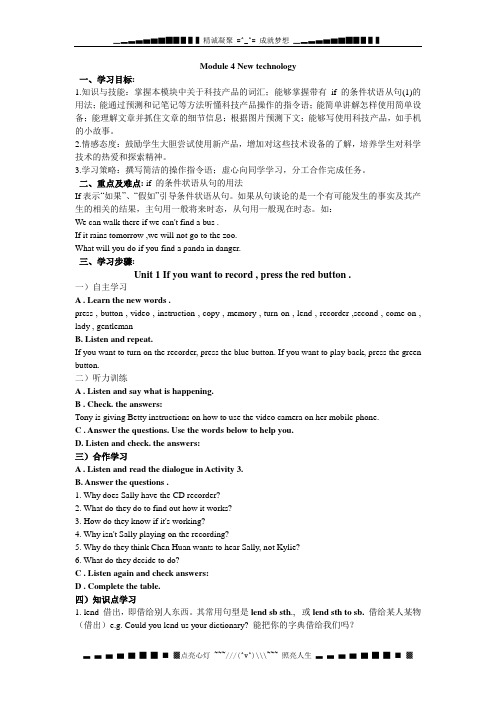
Module 4 New technology一、学习目标:1.知识与技能:掌握本模块中关于科技产品的词汇;能够掌握带有if 的条件状语从句(1)的用法;能通过预测和记笔记等方法听懂科技产品操作的指令语;能简单讲解怎样使用简单设备;能理解文章并抓住文章的细节信息;根据图片预测下文;能够写使用科技产品,如手机的小故事。
2.情感态度:鼓励学生大胆尝试使用新产品,增加对这些技术设备的了解,培养学生对科学技术的热爱和探索精神。
3.学习策略:撰写简洁的操作指令语;虚心向同学学习,分工合作完成任务。
二、重点及难点: if 的条件状语从句的用法If表示“如果”、“假如”引导条件状语从句。
如果从句谈论的是一个有可能发生的事实及其产生的相关的结果,主句用一般将来时态,从句用一般现在时态。
如:We can walk there if we can't find a bus .If it rains tomorrow ,we will not go to the zoo.What will you do if you find a panda in danger.三、学习步骤:Unit 1 If you want to record , press the red button .一)自主学习A . Learn the new words .press , button , video , instruction , copy , memory , turn on , lend , recorder ,second , come on , lady , gentlemanB. Listen and repeat.If you want to turn on the recorder, press the blue button. If you want to play back, press the green button.二)听力训练A . Listen and say what is happening.B . Check. the answers:Tony is giving Betty instructions on how to use the video camera on her mobile phone.C . Answer the questions. Use the words below to help you.D. Listen and check. the answers:三)合作学习A . Listen and read the dialogue in Activity 3.B. Answer the questions .1. Why does Sally have the CD recorder?2. What do they do to find out how it works?3. How do they know if it's working?4. Why isn't Sally playing on the recording?5. Why do they think Chen Huan wants to hear Sally, not Kylie?6. What do they decide to do?C . Listen again and check answers:D . Complete the table.四)知识点学习1. lend 借出,即借给别人东西。
外研版八年级下module4 new technology
Module 4New technology第一部分:重点单词及短语:press, button, video, instruction, copy, memory, lend, recorder, second, lady, gentleman, bite, dish, appear, hide, cool, chest, hurt, wrong, medicine, suggest, text等。
第二部分、重难点知识讲解一、单词讲解copy v.复制;复印n.备份;一本It is not right to copy others’ homework.1)注意copy和write的区别:copy指把自己或是别人以写出的材料重新抄写一遍。
write可指机械性的写,也可以指创造性的写信,写文件等。
2)含有copy的习惯用语:copy down抄下来;记下来lend v.借出Could you lend me one hundred yuan?1)注意lend和borrow的区别:lend表示“借出”,是针对于主语来说的。
borrow表示“借入”,也是针对语主语来说的。
2)构成短语: lend sb. sth.=lend sth. to sb.含义是“把某物借给某人”。
second n.第二;秒This is the second time I have met him.1)相关短语:second-hand二手的;旧的2)second作数词,含义是“第二”。
3)second也有名词含义“秒”,是可数名词。
bite v.咬My monkey doesn’t bite.1)bite的过去式和过去分词分别是:bit和biten。
2)bite常用于下面句型中:“bite +宾语+介词+身体的某一部分”,如:The snake bit him on the hand.蛇咬伤了他的手。
appear v.出现;显现The sun appeared on the horizon.1)扩展词:appearance n.出现;到来2)appear是不及物动词,没有被动语态。
八年级英语module 4 new technology外研社知识精讲
初二英语Module 4 New Technology外研社【本讲教育信息】一. 教学内容:Module 4 New Technology二. 重点内容:If 引导的条件状语从句三. 具体内容:(一)语法知识If引导条件状语从句。
在含有条件状语从句的主从复合句中,当主句谓语动词以某种形式表示将来时间概念时,条件状语从句中的谓语动词通常要用一般现在时代替一般将来时。
此句中主句为用祈使句表将来,if引导的状语从句用一般现在时。
If you see him , give him this letter .如果你见到他的话,把这封信给他。
(二)知识拓展:引导条件状语从句最常用的连词是if,由if引导的条件状语从句表示在某种条件下某事很可能发生。
如:If you ask him,he will help you .如果你请他帮忙,他会帮你的。
If you fail in the exam , you will let him down .如果你考试不及格,你会让他失望的。
另外,if从句还表示不可实现的条件或根本不可能存在的条件,也就是一种虚拟的条件或假设,从句多用一般过去时或过去完成时。
如:If I were you , I would invite him to the party .如果我是你,我会邀请他参加聚会。
I would have arrived much earlier if I had not been caught in the traffic .如果没有堵车,我会到的早一点儿。
那么,除了if之外,是否还有其他连词也可以引导条件状语从句呢?回答是肯定的,不仅有,还有很多。
这些词由于出现的频率较小,且用法较复杂一些,所以不为大家所熟知罢了。
下面就这些词的用法以例句的形式进行一下简单总结。
(1)unless conj . 除非,若不,除非在……的时候You will fail to arrive there in time unless you start earlier .如果你不早点动身,你就不能及时赶到那儿。
初中英语《Module4Newtechnology》单元教学设计以及思维导图
Module4 New technology这一个专题主要是解决U1U2中的主要语法和知识点。
主要是为了梳理并掌握很模块的语言知识点,并让学生对本模块的所有知识能学以致用。
本专题的设计思路:教师出示本模块的主要知识点和语法知识-----学生借助工具书自学并做好记录----本组内进行针对疑难点的讨论,组长做好记录----师生一起解决疑惑----学生整理笔记----巩固练习。
为了帮助学生能学以致用,整个专题的教学活动都以学生的参与为主要目标。
通过自学---讨论---师生一起解决疑惑等多种活动形式,在自主探究中归纳归纳总结规则,在语言运用中形成语言技能,在限时写作中提升运用能力。
学生学习的重、难点:语法知识---if引导的条件状语从句,lend, borrow, keep的区别,。
主要学习方法:自学、讨论、做题巩固、整理笔记、二次测试(强调语言运用)预期成果:能熟练掌握并运用:if引导的条件状语从句,lend, borrow, keep的区别,come和connect 的相关短语?专题学习目标教学支撑教室环境其他学习活动设计课前导入Step1: 1.Ask 8 students to write down their wring on the blackboard, the group leader check the writing.2.The teacher explain some mistakes.Step : learning the languages【教学活动】:(一)1.The teacher show some questions about “for”. (见PPT28)1. I have known him _____3 years. for:表示时间的长短2.Thank you ______ helping me. for因为3.It’s important ______him to study hard. for 对于4.I walked ______300 miles. for 表示距离5.He went to Australia _____ holiday. for 为了,表目的2.The students answer the questions, then tell us the meaning of “for”3.Ask the students tidy up their notebook,【设计意图】:因为介词for 在七年级时已经学过,但是又是常考的重点,所以在这里用题的形式来复习一下。
Module 4《New technology》教案(外研版八年级下)
Module 4 New technology一、词汇:见书后附录:二、重点词组:1.play back ( the video ) 重放(录像)2.take the video 摄像3.save the video ( on the computer ) 把录像保存在电脑中补充: save (up) 存(钱), 储蓄e.g. He’s saving up for a new bike. 他正在存钱买辆新车.4.connect … to/with …把…与…连接5.borrow sth from sb 从某人处借某物(针对主语而言是借入)lend sth to sb / lend sb sth把某物借给某人(针对主语而言是借出)e on (灯或机器)打开,开动; 赶快; 加油7.send sb sth / send sth to sb 给某人发送某物8.send sth by email 通过电子邮件发送…9.welcome to some place 欢迎到某地 e.g. Welcome to China! (注意:Welcome home!)dies and gentlemen 女士们,先生们e…for sth/doing sth. 或use…to do sth. 用…做某事e.g. They’d like to use the paper cuts for the decoration. 他们想用这些剪纸来做装饰.I use my bike for (going) shopping. 我用我的自行车去购物.We used the money to set up a monument. 我们用这笔钱树立了一块纪念碑.You can use a mobile phone to take photos. 你可以用手机照相.12.take a photo of…给…照相e.g. Dare you take a photo of a snake? 你敢给蛇照相吗?13. save one’s life 挽救某人的生命14. pick up sth/sb 捡起, 拿起; (用车)接某人(注: pick it/them up) 区别: pick (the flowers / the apples…) 摘(花, 苹果)15. climb out of…从…中爬出来/ climb into…爬到…里去16. stay cool 保持冷静(同义:be calm )17. go to hospital 去医院(看病) be in hospital 住院18. what kind of…哪种…19. leave hospital 出院20. the next day 第二天21. take a photo / take photos 照相22. show sb sth / show sth to sb 出示某物给某人看23. Don’t worry. 别担心24. be surprised at…. 对…感到惊讶25. be safe from…很安全, 没有受到…的威胁26. advise sb. ( not ) to do sth. 建议某人(不要)做某事27. be good for…对…有好处/ be bad for…对…有害处e.g. Eating vegetables is good for health. 吃蔬菜对健康有好处.Reading in bed is bad for eyes. 躺在床上看书对眼睛有害.28. smile at sb. 冲某人微笑/ laugh at sb. 嘲笑某人29. on holiday 过假期/ on business 出差30. don’t have to = needn’t 不必三、重要知识点1.How does it work? 它(机器)是怎么运作的?It doesn’t work. 它坏了. Is it working? 它行吗?还运作吗?2.with+(a mobile phone, a knife, a hammer…用+工具(如:手机,小刀,锤子等)区别:in English / French / Spanish / German用(语言) in ink用墨水by bus/car/train 乘坐交通工具, by email 通过电子邮件3.bite / hit +某人+介词(on或in)+ the +部位(注意动词的过去式及分词:bite bit bitten; hit hit hit )e.g. The dog bit him in the leg. 这条狗咬了他的腿.The snake bit her on the hand. 那条蛇咬了她的手.She hit him on the head with a book. 她用书打他的头.这里,用in还是用on是固定的,一般的规律是较硬的部位用on,较软的部位用in。
- 1、下载文档前请自行甄别文档内容的完整性,平台不提供额外的编辑、内容补充、找答案等附加服务。
- 2、"仅部分预览"的文档,不可在线预览部分如存在完整性等问题,可反馈申请退款(可完整预览的文档不适用该条件!)。
- 3、如文档侵犯您的权益,请联系客服反馈,我们会尽快为您处理(人工客服工作时间:9:00-18:30)。
2. What part of your body do you use to throw something?
I may use my hands and arms to throw something.
3. What happens if you put food in a fridge?
The fridge keeps the food cool and fresh for a longer time.
2. He picked up a dish from the table , and suddenly a snake appeared … and bit him on the hand.
他从桌子上端起一个盘子,突然,一条蛇出现了并咬伤了
他的手。 (1)pick up “捡起,拾起”,其宾语为代词it或them时,
Module 4 New technology
Unit 2 If a snake bites you, take a photo.
Lead in
Talk about what you can do with a mobile phone.
You can use a mobile phone to call people/play music/take photos ...
4.The doctors gave Mr Jackson the right medicine when______. a) London Zoo told them what kind of snake it was b) he left hospital the next day c) Mr Jackson sent the photo to the hospital d) the snake bit him
Presentation
咬 v. 挽救某人的生命 盘子;(一道)菜 n. 出现 v. 隐藏 v. 冷静的;凉爽的 adj. 刺痛;伤害 v. 失常的;错误的 adj. 药物 n. 建议 v. bite save one’s life dish appear hide cool hurt wrong medicine suggest
d) the fridge door was open
3.Mr Jackson closed the fridge door so that_______. a) he could take a photo
b) the snake became cool
c) the snake couldn’t go back to the zoo d) he was safe from the snake
Language points
1.It may save your life. 这也许能救你的命。
save one’s life 挽救某人的生命
He hurt badly , and the doctors couldn’t save his life. 他伤得太重了,医生不能挽救他的生命。
save的其他含义: 节约,保存,储蓄 (1)We should save water and power.我们应该节约水电。 (2)Children should learn to save. 孩子们应学会节约。 (3)Save your strength for the hard work you’ll have to do later. 留着点儿劲儿,你一会儿还得干重活儿呢。
Read and choose the best answer.
1.When the snake bit Mr Jackson, it was________.
a) hiding in a box of bananas
b) lying under a dish
c) climbing out of a box of bananas
4. What kind of food do you advise people to eat because it’s
good for healthy food like fruit and vegetables.
5. When do you smile at people? When I’m happy or I like them. 6. Where has something been just before it lands? It has been in the air.
必须放在中间。
“Whose book is it?” he said , and then he picked it up. “谁的书?”他说道,并把它捡了起来。
(2)bite him on the hand “咬伤了他的手”
Answer the questions about the words in the box.
fridge hurt kind land smile throw
1. What parts of your body hurt after exercise? Legs and arms may hurt after exercise.
d) climbing into the fridge
2.Mr Jackson threw the snake across the room probably
because _______.
a) he was surprised
b) his chest began to hurt
c) he wanted to get a better photo
What can you use a
mobile phone to do?
take a photo call people listen to music
Look at the picture
What is the cook doing? The cook is taking a photo of a snake.
